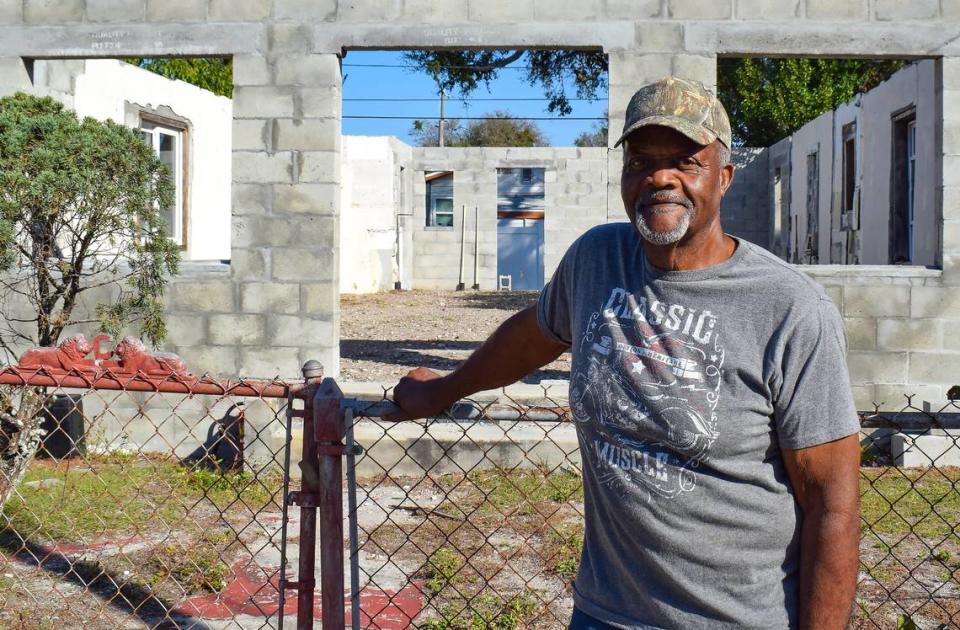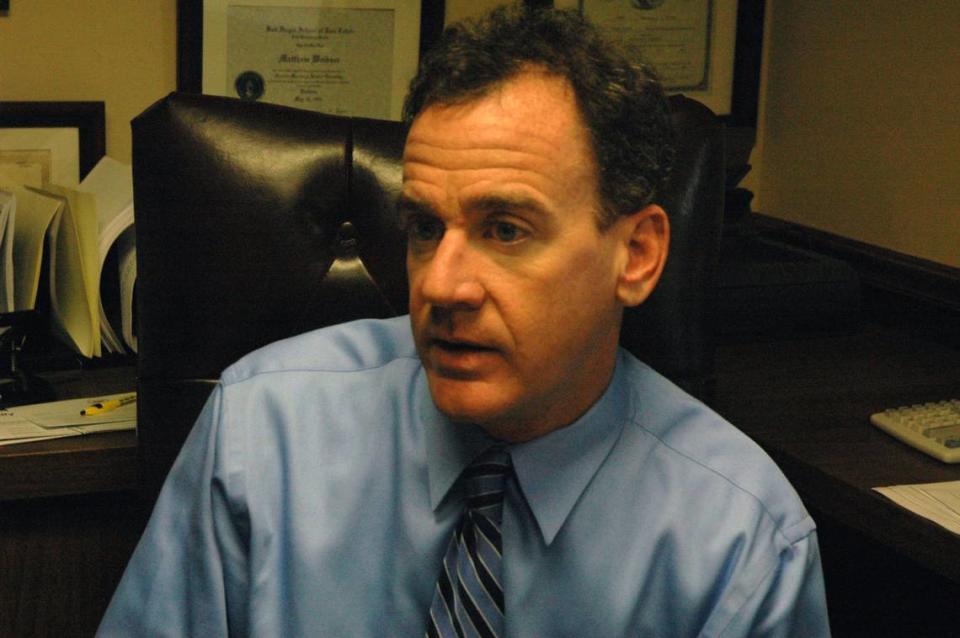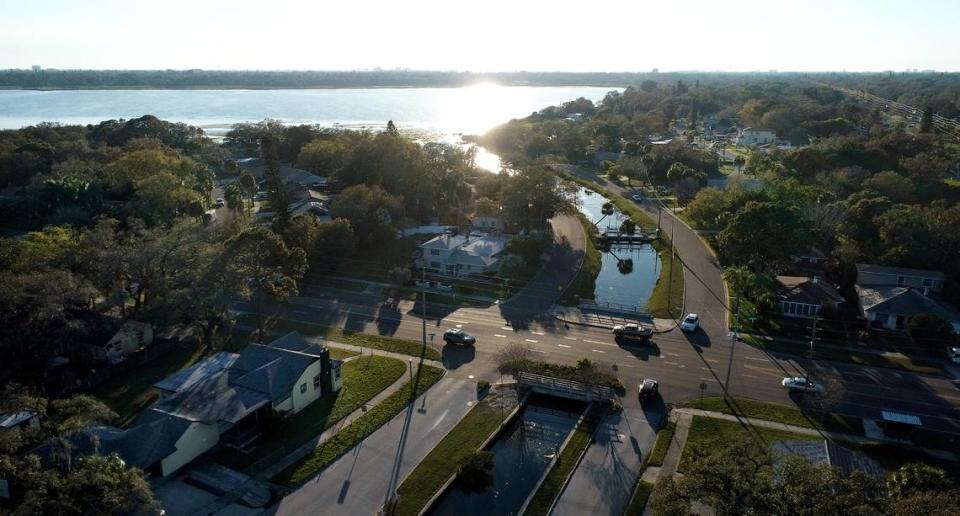Florida cities ramped up foreclosures to hurt speculators. Instead they helped them
In 2015, then-St. Petersburg Mayor Rick Kriseman championed a plan to crack down on the city’s so-called “zombie properties” by aggressively foreclosing on them.
The city would target poorly maintained properties that had racked up big fines and code enforcement liens with the hope that new ownership would lead to community redevelopment.
City leaders believed the plan was the first of its kind in the state and signed a contract with a local private attorney named Matt Weidner to bring the city’s cases to court.
Weidner had been a donor to Kriseman, a Democrat who was elected in 2013 after previously serving in the Florida House of Representatives.
But Weidner brushed aside any concerns about impropriety.
“This is not a plum deal, which is going on forever or one that involves much money at all,” he said at the time.
Weidner’s predictions, however, haven’t come to pass.
Eight years later, he continues to bring foreclosure cases on behalf of St. Petersburg. To date, he’s been paid nearly $1.5 million by the city for his work.
And he’s signed contracts with eight other jurisdictions across Florida to do similar work since then, bringing in an additional $1.4 million in fees and expenses.
Weidner has sold cities on the idea that they can transform code enforcement rules that used to be intended to achieve compliance into money-makers, by aggressively collecting money cities were owed from fines — or, in the alternative, taking the homes of owners who can’t pay.

The lawsuits have undoubtedly brought about improvements to many of the properties targeted, either through new, more active ownership or by forcing existing owners to improve their practices.
But a Miami Herald investigation based on a review of thousands of pages of court records from more than 775 lawsuits and interviews with numerous property owners targeted by Weidner and his client-cities shows that they have also caused harm.
In St. Petersburg and other cities, the goal was to target properties owned by real estate speculators who obscured their ownership of derelict properties through layers of shell companies.
But the Herald’s reporting shows that these foreclosures have often had the opposite effect, taking properties out of the hands of individual owners and delivering them to real estate speculators, and at a discount.
Several owners felt railroaded by an aggressive legal process that typically wrapped up in a few months. Some owners said they were notified too late in the process to mount a meaningful defense, while others lost houses over infractions involving landscaping violations and failing to mow the lawn. And the foreclosures have even forced some people onto the streets.
‘Perverse incentives’
Weidner promises cities that he can not only help them reap millions in untapped revenue — but with no money up front.
That’s because the cities enter into what’s called a contingency-fee agreement with Weidner. He covers all the up-front expenses and the cities give him a cut of whatever amount they recover in each suit — typically on a sliding scale from 25% for cases in which he reaches a resolution without filing a lawsuit to 40% for the most complex cases.
READ MORE: Families lose homes after Florida cities turbocharge code enforcement foreclosures
This type of agreement is fairly common in private practice, most commonly in personal-injury cases or big class-action lawsuits.
It gives people who have been harmed but can’t afford an attorney access to legal representation and the interests of lawyers and their clients in these cases are typically aligned: They each want to extract the biggest payment from the party they are suing.
The legal picture is a little more complicated for public entities, such as cities and states, which are expected to take into account the broader public interest when deciding whether to pursue legal action.
“Contingency fees do create some perverse incentives to get money in as soon as possible and as easily as possible,” said David Dana, a law professor at Northwestern University who has written about these types of agreements. “They don’t necessarily correlate with what would be the best public policy perspectives.”
Plenty of cities and states have entered into contingency-fee agreements with outside attorneys, but they tend to be for complex legal cases, such as the lawsuits states filed against tobacco companies in the 1990s or, more recently, lawsuits city and state governments have filed against opioid manufacturers.
But the cases Weidner has brought on behalf of St. Petersburg aren’t nearly as complex — a fact the city’s own attorney acknowledged when the St. Petersburg City Council first approved its contract with Weidner.
“Foreclosures are easy,” said John Wolfe, the city attorney at the time.
Dana, the law professor, sees the contracts Weidner has signed with St. Petersburg and other cities as problematic for exactly that reason.
“There isn’t a substantial reason why these can’t be done in-house,” he said.
The terms of the contract came as a shock to many of the property owners the Herald spoke with who had been targeted in these suits.

“You’ve got to be kidding me, that’s wrong within itself,” said Wade Clark, a veteran and former police officer who lost his home in Clearwater after Weidner foreclosed on the city’s behalf.
Officials in Clearwater — where one of Weidner’s former staff attorneys, Michael Fuino, is now an assistant city attorney — disputed the idea that the nature of Weidner’s contract could create “perverse incentives” because Weidner has no involvement in the code enforcement process.
Fruitland Park City Manager Gary La Venia said that Weidner’s activity is limited by the city, which is 50 miles northwest of Orlando.
“[He] only acts on matters the City directs him to act on. Nothing more,” La Venia said. “That’s how the City wants it. This City is very conservative in these matters.”
To date, Weidner has filed only four lawsuits on behalf of Fruitland Park.
St. Petersburg said in a statement that Weidner “generally works independently.” It added that the city attorney’s office “communicates with him as needed as legal issues arise.”
Bradenton, meanwhile, contracts with an outside firm to provide city attorney services, so there is no option for an in-house attorney to provide oversight of Weidner’s work. But while city administrator Rob Perry, a lawyer himself, understood the potential for abuse in such an arrangement he said he thought that the city’s relationship with Weidner mitigated that possibility.
“I think quite honestly that with the city’s involvement and oversight of this, I don’t think it’s a concern,” he said.
Weidner spoke with the Herald during the reporting process but didn’t respond to a detailed set of questions ahead of publication, which included questions about his contracts and the potential for “perverse incentives.”
‘Much Needed Municipal Revenue’
Weidner brings lawsuits against properties that have accrued hefty fines and liens for violating municipal codes.
Properties can be dinged with code enforcement violations for problems as minor as an uncut lawn or as serious as major structural or safety issues that require a property to be torn down.
Cities typically assess a fine for problems that aren’t immediately resolved and these fines can increase by $100 or more daily, even after the problem has been fixed. In the lawsuits analyzed by the Herald, the amount of these fines was often vastly greater than the value of the homes themselves.
Weidner’s pitch to cities is simple: By practicing what he calls “active code enforcement,” they can target abandoned properties with outstanding code enforcement liens and force them to pay up, or seize their homes and sell them at auction, potentially bringing in millions of dollars in additional revenue.

“There’s a simple question that I want people to ask — what is the total amount of total liens that are outstanding?” Weidner said. “How many tens of millions of dollars have been lost? It’s massive.”
Weidner has courted city officials as a speaker and sponsor at statewide conferences aimed at city managers, code enforcement officers and community redevelopment officials. He also sends unsolicited emails to city officials across the state.
The Miami Herald filed more than two dozen records requests with the cities that have hired him as well as cities and counties across South Florida and the messages they turned over paint a picture of his efforts.
“SUPERCHARGE YOUR LOCAL ECONOMY AFTER COVID-19,” he wrote in a May 22, 2020, e-mail to then-Boynton Beach City Manager Lori LaVerriere.
“Vacant Lots = Much Needed Municipal Revenue!,” reads a July 24, 2020, message he sent to an official in Davie.
“This is your most POWERFUL Tool For Economic Development!” reads another message he sent on April 1, 2021, to an official in Boca Raton.
None of those messages led to contracts, but he had more success with a 2021 effort in Fort Pierce after the Florida Redevelopment Association conference that went from initial contact to signed contract in less than a month.
“I wanted to follow up with you after the CRA conference in Ft. Myers and share with you this short video that explains how cleaning and clearing title gets capital flowing into your CRA...and throughout your community!,” Read a message from Weidner that Fort Pierce City Manager Nick Mimms forwarded to the city’s attorney, Tanya Earley, asking her to get in touch.
The message included a link to one of the many videos Matt Weidner has created to tout his practice, this one voiced by a narrator with a foreign accent and featuring an animation showing whiteboard sketches explaining his approach to aggressively pursuing code enforcement.
Earley and Weidner spoke that same day, according to the messages, and Weidner sent along a draft contract and a document with links to news stories about his work and videos of presentations he’d given, as well as a list of references from other client-cities.
“Since 2016, we’ve completed a universe of more than 1,000 cases and have shown great success in every community we’ve worked in,” Weidner wrote.
A week later, Earley sent back a revised contract and advised him of the next steps they would need to take to win approval from the city.
“What a great way to start the Monday!” Weidner wrote back. “I’d love to come do a ride along and see the ground from your perspective and that of code staff….it’s great to know this concept has buy in from them….and we’re going to see how they become the most powerful advocates of positive community change.”
Just over three weeks later, Weidner and the city had a deal.
In late January, Weidner filed the first of what would be 57 foreclosure lawsuits he brought in 2022 in Fort Pierce, a town of fewer than 50,000 residents. That’s more lawsuits than the city of Miami — which is 10 times as large — filed in the past decade.
While many of the Fort Pierce cases remain outstanding, Weidner has taken in just under $80,000 in fees and expenses for his work on 15 cases that have been resolved so far.
Fort Pierce officials didn’t respond to questions about the city’s contract with Weidner or the cases he has brought.
The beneficiaries
Weidner’s contract with Fort Pierce came at an opportune moment.
The city represented more than half of the 100 code enforcement lawsuits he filed last year, according to the Herald’s analysis of court records.
While Weidner’s firm has taken in a relatively steady flow of money over the past six years from this kind of work — an average of roughly $450,000 in fees and expenses per year — the number of cases filed per year plummeted in 2020 and hasn’t fully recovered.
Weidner’s firm even took out two federal Paycheck Protection Program loans in 2020 and 2021 totaling roughly $185,000 to account for lost work in the early days of the COVID-19 pandemic., though it isn’t clear to what extent losses related to foreclosures. Both of the PPP loans were forgiven.
The drop in cases is in part because the work Weidner has done for St. Petersburg has slowed — he’s filed just under 50 cases in the past two years compared to more than 130 in 2019. The city said that through the “successful implementation of the city’s foreclosure program,” which relied on Weidner, the number of “zombie properties” in the city has declined to only 70 from a total of nearly 1,000 near the end of the Great Recession.
“I thought the program was incredibly effective for us in St. Pete,” said Kriseman, the former mayor.
But Weidner’s continued work for the city wasn’t part of the original plan.
As part of his contract, Weidner was supposed to train a city attorney to take over the work.
That hasn’t happened.
The city said in a statement that while an assistant city attorney “initially shadowed” Weidner, “staffing changes and the process established by Mr. Weidner” led the city to conclude that it was “more efficient” for Weidner to continue doing the work.
And it’s not the only thing that hasn’t gone as intended.
Weidner and city leaders imagined that their program would target real estate speculators.
“Corporate landlords, that was the mission,” said Todd Yost, the city’s director of code enforcement in the early stages of the program. “When I was there, I would not go after any mom and pops.”
Instead, the majority of property owners named in the suits have been individuals. Corporate entities have accounted for fewer than one-third of the lawsuits, according to the Herald’s analysis of the cases.
And many of the properties that were foreclosed upon and sold — particularly in the early going — were snapped up by the types of buyers the program was supposed to target, said Karl Nurse, a former member of St. Petersburg’s City Council, who chaired what was then called the Housing Services Committee as the program got underway.
“Unfortunately, it was mostly sort of vacant lot speculators,” he said. “They weren’t building housing on it, which was our fundamental goal.”
Nurse, who is passionate about affordable housing and sits on the board of two non-profit organizations focused on the subject, bought several properties himself, which he turned over to non-profit housing groups.
The city conducted an analysis of 100 of the properties that had been foreclosed upon and sold and found that two in five had amassed new code enforcement penalties under their new ownership, though it pointed out that 70% of the sampled properties had been redeveloped.
Nurse sees the program as a success overall but also said that in hindsight he wished the program had prioritized getting as many of the foreclosed properties into the hands of non-profit groups as possible and included requirements that buyers actually develop or improve the properties they bought.
St. Petersburg’s statement indicated that through “the lens of continuous improvement” the city changed its approach to the program after noticing that investors were buying a large number of the foreclosed properties at the beginning of the program. Instead, the city began buying more of the properties itself with the goal of turning them over to developers to build affordable housing.
It says that 31 affordable homes have been completed and sold so far, with 21 more on the way.

That hasn’t been the case with the the vacant lot where Malekia and Maya McKinney’s childhood home once stood. It’s essentially unchanged from when it was in their family — except for piles of debris that were dumped on it at some point since the property was foreclosed and sold in 2018. Its current owner is St. Petersburg.
The program has had some clear beneficiaries.
It has generated approximately $3.5 million dollars in additional revenue for St. Petersburg.
And Weidner has been paid nearly $1.5 million in fees and expenses from St. Petersburg since the program first began. He’s also brought in nearly the same overall from the other cities and counties that subsequently hired him.
The fortunes of several city employees who helped implement it have also improved.
Rob Gerdes took over the code enforcement department after Yost left and is now St. Petersburg’s city administrator. James Corbett, a code enforcement employee who was crucial to the program’s early implementation, is the head of development for the city.
As for Kriseman, he remained connected to the program even after term limits ended his time as mayor.
After leaving office in 2022, he followed a time-worn path to a career in lobbying.
One of his first clients, which he no longer represents?
Weidner Law.

